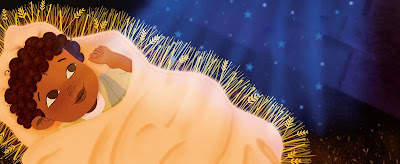A Christmas Eve sermon inspired by Isaiah 26:16-19 and Luke 2:1-14 as found in The Women's Lectionary for the Whole Church Year W
What are we even doing here? Not how you thought I was gonna start this, was it! Seriously though, why do we do this every year? Why do we put ourselves through all of this? I like Christmas as much as the next guy but dear lord, is it really worth it all? All the stress? All the running around? All the credit card debt? All the anxiety? All the manual labor? Emotional and mental labor? All the family drama? All the awkward conversations at Christmas parties? All the sitting and standing at church, not to mention another sermon! How many of these do you actually need? Didn’t the last one stick? – Is anybody out there thinking, now that you put it that way, why do we do this every year? It’s a lot, isn’t it! I mean, baby Jesus is cute and all, just look at him, he’s adorable! But he ain’t no baby no more!Even he is too old for Christmas! So the question remains. Why do we do continue to do this every year? Hold that thought, cuz I’d like to highlight one of our readings that Stephanie just read for us. Thank you, Stephanie. It was the first one, which came from the book of Isaiah. I don’t know if you noticed, but it wasn’t your typical Christmas Eve reading, to say the least! Isaiah was throwing around words like distress, disciplined, labor pains, writhing, dust, and just for good measure, corpses! Well, now that I say them out loud, that does sound a lot like Christmas! When did I become such a Grinch? Honestly though, I had to double check that I didn’t look up the wrong reading! This sounds more like an episode of The Walking Dead than Christmas Eve! And for those of you who’ve never seen that show, it’s about zombies, walking corpses. That’s really all you need to know to get that reference.
So, I read it again, and it made me cry, right there in the library! I didn’t make a fool of myself or anything, but tears were formed. And I think it’s because it is one of the most real, authentic, raw, Christmas Eve readings I’ve ever heard. You adults, do you remember when we were kids, and Christmas was just nothing but fun and joy and receiving? And I know that not everyone experienced that as children, and if that’s you, my heart goes with you. But then we became adults and realized that Christmas doesn’t just happen, does it? We adults have to make all that happen! On top of all of the family stress, work stress, relationship stress, children stress, financial stress, mourning the faces we won’t see at the Christmas dinner table this year. On top of all that and more, we got to make Christmas happen!
Isaiah, describes a woman giving birth, and it’s the perfect analogy. Think about it, for those of you who have seen a woman give birth, up close and personal like, and that same woman decides later to have another one, tell me you didn’t think, Why!? Why would you do that again? That was horrible! It was horrible for me! And I just stood there like an idiot taking pictures! If ever there was a reason why women should rule the world, that’s it right there. Those who can push a baby out their body and say, Let’s do that again, should be calling the shots! Am I right? I have a strong feeling that Isaiah, like Jesus, had a good momma. I think if they had asked their mothers, why did you have me if it hurts so much, they’d have said, because I couldn’t wait to meet you, silly!
Because they knew, as most mothers do, that it’s not about them, it’s about something bigger than them, something more profound than even a mother. If we’re honest, we don’t know as parents how our kids are gonna turn out! So why go through all the trouble, all the pain, if there’s no guarantee it’ll be worth it all!? Well, here’s my answer to that question. Because mothers, like Mary and Isaiah’s momma, have this uncanny ability to sense a bigger picture at work in their lives and the lives of those around them—an insight into
a hope bigger than any kind of
hope we humans can muster,
a love bigger than our love,
a promise bigger than our
flailing attempts to keep our word,
a faithfulness so big that it
puts our human loyalties to shame,
a selflessness that makes us question if we even know what sacrifice is!
That, my friends, is why we gather here, year in and year out, on this night, during a time when the nights are at their longest, and we succumb to the Earth’s shadow for so long that our very hearts and souls can feel its weight! We do this every year because this is our opportunity to thumb our noses at all that tries to keep us down,
at all that tries to lead us to
despair,
at all the walking corpses that follow us around,
the corpses of pain,
the corpses
of heartache,
the corpses of stress,
the corpses of unrealistic
expectations,
the corpses of self-doubt,
and all the other walking corpses
who aren’t worthy to be named,
on this night we tell them
all where they can go,
because Mary didn’t raise no baby!
Mary raised the very hope she
knew was bigger than our hope,
the very love she knew was bigger
than our love,
the very promise she knew was
bigger than ours,
the very faithfulness she knew
was bigger than ours,
the very selflessness she knew
was bigger than ours…
Mary…raised…Jesus!
That, my friends, is why we find
ourselves here again: Mary’s little baby boy, born for us again, when we need
it the most. Amen? Amen.




.jpg)

.jpg)